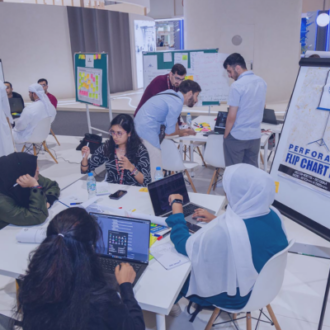The NPP/FAN Virtual Seminar Series continues on Wednesday, 15 May with the third virtual seminar about Archives and Education, Training and Research. This session will allow for critical reflection on the available pathways to becoming an archivist. The papers selected for this first seminar were chosen from the call for papers launched last year. The titles and presenters of these papers are:
- Building an inclusive archival profession – Pilar Fernández Padierna
- Alternative Pathways: Perspectives on Diverse Education and Training to become an Archivist – Brittany Long and Lydia Schriemer
- The historian and archivist conundrum – Saman Quraishi
- Archival education as a pathway to practice: A global perspective – Panel discussion with NPP Alumni hosted by Rebecca Adams, Randolphe Hildebert Aglikpo, Saman Quraish, Susannah Tindall and Laura Yturbe Mori
These presentations will allow the participants to consider different approaches globally to how archivists are trained and what the gaps are between education/training and practice. More details about the abstracts and authors of the papers can be found below.
This third virtual seminar will be moderated by Leslie Weir, Librarian and Archivist of Canada, Library and Archives Canada. Each paper will be followed with time for questions.
The seminar series is organized by the New Professional Programme (NPP) in collaboration with the Forum of National Archivists (FAN). This virtual event is part of the celebration of the 10th anniversary of the ICA New Professionals Programme.
Seminar three – Archives and Education, Training and Research




The seminar is free and open for anyone to join, with recordings made available through the ICA YouTube channel. Registration is required to receive full details on how to connect to this virtual meeting.
PAPER PRESENTATIONS
This presentation deals with the reality of inclusion in the archival profession, especially in public administration, emphasizing the reality of Spain through current laws, and how selection processes are carried out taking into account this group of people with disabilities, and what it means for them to be able to work in archival institutions, overcoming the barriers to access to the profession and work on a daily basis through some examples.
The idea is to show the importance of the professional contribution of people with disabilities in archives and help facilitate access to these institutions without ignorance or prejudice.
Pilar Fernández Padierna is an Archivist and Record Manager, assigned to the Technical Unit for the Coordination of Judicial Archives of the Community of Madrid and the Territorial Judicial Archive of the Community of Madrid. Pilar’s role includes managing files and documents identification, classification and archival description, as well as the accession area (retention and disposition schedule management and fonds controlling) and electronic judicial archive implementation, among other archival assignments.
The traditional route to an archivist job is a degree in archival science. At Library and Archives Canada (LAC), however, we hire archivists with a much more diverse range of educational backgrounds. Graduate degrees in history, anthropology, or even law could get you in our door. While the archivist jobs available at LAC certainly do include the standard arrangement and description roles, our archivists also take on a more interdisciplinary role – supporting our Access to Information and Privacy Branch, performing historical research in the archives, and even reviewing archival material for declassification. As archivists on LAC’s newly formed Declassification Team, we will speak to the distinct education, research, and training that brought us and our team to where we are today.
Brittany Long is a declassification archivist at Library and Archives Canada where she works on a range of records with an emphasis on external affairs and security. She received her Master of Arts in History from Carleton University in 2021. Her research interests focus on 20th century Germany, gender, perpetratorship, and social history.
Lydia Schriemer is a declassification archivist at Library and Archives Canada where she works largely on research and defense files. In her spare time, she is completing a PhD on the effects of religious change on women’s legal status. Beyond that, her research interests center around gender, law, and social history.
The presentation will discuss the negotiations professionals who work as an archivist, without being trained to be one, undertake. Often in geographies and regions where training programs to become an archivist are not prevalent, there remains a demand for archivists; how do archives manage their vast collections by relying on professionals from varied backgrounds. My emphasis would be on discussing my experience of working in an architectural archives as a trained architect and architectural historian under the title of archivist.
I will highlight the sensitivities of being an archivist that one learns on the job as an untrained archivist and discuss the pros and cons of 'learning on the job'. The presentation will also highlight the gap in the archival training landscape in the geography I am based in that is India and map out the pointers that advocate for training programs to be developed in such regions. Along with presenting a brief work in progress pedagogical framework of archival training that could be further developed into a rigorous professional training program.
Saman Quraishi is an Architectural Historian by education. She is associated with CEPT Archives, one of the first architectural archives located in Ahmedabad, India as an Assistant Archivist. She was also the ICA Active New Professionals 2022-2023.
The panel consists of archives professionals from various countries and professional backgrounds who have completed the ICA’s New Professionals Programme in recent years. Panellists will answer questions concerned with their training and education, their routes into the sector, and what future professional development might look like. They will consider the different approaches to archival training that are available globally, the pros and cons of those pathways, and any gaps between training/education and practice.
Rebecca Adams is an Archivist at the University of Birmingham, Special Collections responsible for the Professor Stuart Hall Archive. She previously worked at the London Metropolitan Archives where she was the project archivist responsible for the Africa Centre Collection and the Mollie Hunte Collection. She was also a part of the International Council on Archives (ICA) New Professional Programme 2022-2023. Rebecca’s key interest’s stem from her African-Caribbean background which include decolonising archives, community archives, archival representation, access, and the work of black archivists in the UK. Rebecca has provided a chapter in ‘New Histories of African and Caribbean People in Britain’ ed. By Hakim Adi.
Randolphe Hildebert Aglikpo holds a master's degree in Digital Information Engineering from the Université Jean Jaurès in Toulouse, France. He also holds a bachelor's degree in documentary information science and techniques, with a minor in archives, from Benin's Ecole Nationale d'Administration (ENA). After graduating, he worked as an archivist in various private institutions, including Atlantique Assurances Bénin Vie, PADME Bénin, Ark'Aiv and Cabinet Archives Afrique.
Saman Quraishi is an Architectural Historian by education. She is associated with CEPT Archives, one of the first architectural archives located in Ahmedabad, India as an Assistant Archivist. She was also the ICA Active New Professionals 2022-2023.
Susannah Tindall works at Monash University in Melbourne, Australia. She has completed a Graduate Diploma in Information and Knowledge Management at Monash University, specialising in archives and records, and a Master of Information Studies (Data Management) at Charles Sturt University. Susannah was thrilled to be a member of the 2021-2022 ICA New Professionals Programme Cohort. Susannah is currently working in the IT Service Desk at Monash University, recognising a need to build her IT knowledge and skills, while providing expert advice on all information and records management queries that come her way. Susannah has a keen interest in the areas of automation and integration, expanding current recordkeeping capabilities to the next generation of technologies. She strives for greater user experience and continual service improvement.
Laura Yturbe Mori holds first place in the Archival and Documentary Management studies program at Universidad Católica Sedes Sapientiae. She has been a delegate of the third group of her program in 2019 – II to 2020 – I. After submitting an academic paper, in 2017, she obtained the first place at the level of evaluation of students of IV cycle of her faculty. In 2019, she began her professional career as administrative support in the Contraloría General de la República and today she continues to work there. In 2021, she published an article in the Revista del Archivo General de la Nación’s bicentennial edition called “Especificaciones ambientales y técnicas de seguridad para el diseño de la infraestructura física de un archivo central”.




